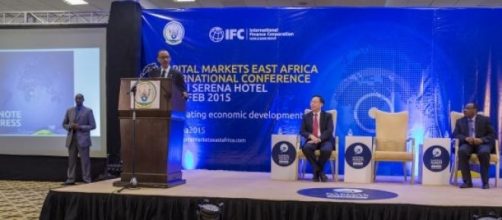Rwanda co-hosted along with the International Finance Corporation (IFC) a high-level international conference dubbed 'Capital Markets East Africa 2015: Accelerating Economic Development' in Kigali, Rwanda, on 12 and 13 of February, 2015. The conference brought together 300 global and regional experts, regulators, law firms, issuers and rating agencies, to discuss issues affecting the development of African capital markets, especially in East Africa.
In his opening remark to delegates, President Paul Kagame said that the business sense of the development of capital markets is self evident.
"They mobilize savings for productive investments, while the price discovery mechanisms make the economy more efficient, dynamic and transparent".
Claver Gatete, Rwanda's Minister of Finance and Economic Planning, was quoted by capital market press release, as saying that capital markets have the potential to play a crucial role in consolidating and sustaining economic growth. "In Rwanda, we are convinced that capital markets provide the best alternative for long-term financing and for development initiatives such as infrastructure and energy".
During the conference Jingdong Hua, the IFC Vice President and treasurer, announced the placement of a 3 year maturity, 9% yield 3.5 billion Rwandan franc bonds ($5 million) with offshore international investors.
"I am very happy with the transaction because this paves the way for the Rwandan franc to become an offshore investment currency". The bonds are the first Rwandan bonds to be placed offshore and will increase foreign investments to Rwanda.
Global experts pointed out that African capital markets will be vibrant if they have the backing of a strong economy. Ted Chu, the IFC chief economist said that if you don't have sufficient growing enterprises, the stock market cannot have a healthy growth. He added that capital markets and the economy are conversely related, and that a single minded focus on capital market is not enough. "If the capital market cannot provide the necessary funding and means for channeling savings into enterprises then it will have hard time to expand".
African Small and Medium Enterprises (SMEs) were urged to adopt capital markets as a way to raise capital for expansion. Nerina Visser, a South African based consultant in Exchanged Traded Fund said that SMEs will, at the same time, be providing investment opportunities to foreign investors who might be interested to trade in shares and participate in wealth creation process that the stock market provides.
However SMEs need to come to the table with well constructed business plans. Salomon Asamoah the Vice President of the African Development Bank made a point at the conference as saying that there is no lack of capital to be invested in Africa. "The problem is having bankable projects".
When it comes to raising capital, Merina noted that African Stock Exchanges should first look within their countries in terms required capital in addition to mobilizing local savings for investment in the stock exchange. "The more you can focus on the internal resources, the more resilient you are as a stock exchange but also as a market", said the South African based consultant. She added that, the more dependent you are on international investment flows, the more vulnerable you become.
Rwanda considers capital market development as a key element of the country's vision in 2020, that is expected to transform the country into a knowledge-based, and middle income economy by the set date.
Five years down the road since its official launch, Rwanda Stock Exchange has raised more than $91 million through equities and $85 million through the issuance of debt instruments by both the government and the private sector.

